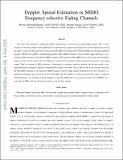| dc.contributor.author | Mohammadkarimi, Mostafa | |
| dc.contributor.author | Karami, Ebrahim | |
| dc.contributor.author | Dobre, Octavia A. | |
| dc.contributor.author | Win, Moe Z | |
| dc.date.accessioned | 2018-06-19T19:37:12Z | |
| dc.date.available | 2018-06-19T19:37:12Z | |
| dc.date.issued | 2017-12 | |
| dc.identifier.issn | 1536-1276 | |
| dc.identifier.uri | http://hdl.handle.net/1721.1/116436 | |
| dc.description.abstract | One of the main challenges in high-speed mobile communications is the presence of large Doppler spreads. Thus, accurate estimation of maximum Doppler spread (MDS) plays an important role in improving the performance of the communication link. In this paper, we derive the data-aided (DA) and non-data-aided (NDA) Cramér-Rao lower bounds (CRLBs) and maximum likelihood estimators (MLEs) for the MDS in multiple-input multiple-output (MIMO) frequency-selective fading channel. Moreover, a low-complexity NDA-moment-based estimator (MBE) is proposed. The proposed NDA-MBE relies on the second- and fourth-order moments of the received signal, which are employed to estimate the normalized squared autocorrelation function of the fading channel. Then, the problem of MDS estimation is formulated as a non-linear regression problem, and the least-squares curve-fitting optimization technique is applied to determine the estimate of the MDS. This is the first time in the literature, when DA- and NDA-MDS estimation is investigated for MIMO frequency-selective fading channel. Simulation results show that there is no significant performance gap between the derived NDA-MLE and NDA-CRLB, even when the observation window is relatively small. Furthermore, the significant reduced-complexity in the NDA-MBE leads to low root-mean-square error over a wide range of MDSs, when the observation window is selected large enough. | en_US |
| dc.publisher | Institute of Electrical and Electronics Engineers (IEEE) | en_US |
| dc.relation.isversionof | http://dx.doi.org/10.1109/TWC.2017.2787539 | en_US |
| dc.rights | Creative Commons Attribution-Noncommercial-Share Alike | en_US |
| dc.rights.uri | http://creativecommons.org/licenses/by-nc-sa/4.0/ | en_US |
| dc.source | arXiv | en_US |
| dc.title | Doppler Spread Estimation in MIMO Frequency-Selective Fading Channels | en_US |
| dc.type | Article | en_US |
| dc.identifier.citation | Mohammadkarimi, Mostafa, et al. “Doppler Spread Estimation in MIMO Frequency-Selective Fading Channels.” IEEE Transactions on Wireless Communications, vol. 17, no. 3, Mar. 2018, pp. 1951–65. | en_US |
| dc.contributor.department | Massachusetts Institute of Technology. Department of Aeronautics and Astronautics | en_US |
| dc.contributor.department | Massachusetts Institute of Technology. Laboratory for Information and Decision Systems | en_US |
| dc.contributor.mitauthor | Win, Moe Z | |
| dc.relation.journal | IEEE Transactions on Wireless Communications | en_US |
| dc.eprint.version | Author's final manuscript | en_US |
| dc.type.uri | http://purl.org/eprint/type/JournalArticle | en_US |
| eprint.status | http://purl.org/eprint/status/PeerReviewed | en_US |
| dc.date.updated | 2018-04-18T13:09:20Z | |
| dspace.orderedauthors | Mohammadkarimi, Mostafa; Karami, Ebrahim; Dobre, Octavia A.; Win, Moe Z. | en_US |
| dspace.embargo.terms | N | en_US |
| dc.identifier.orcid | https://orcid.org/0000-0002-8573-0488 | |
| mit.license | OPEN_ACCESS_POLICY | en_US |

